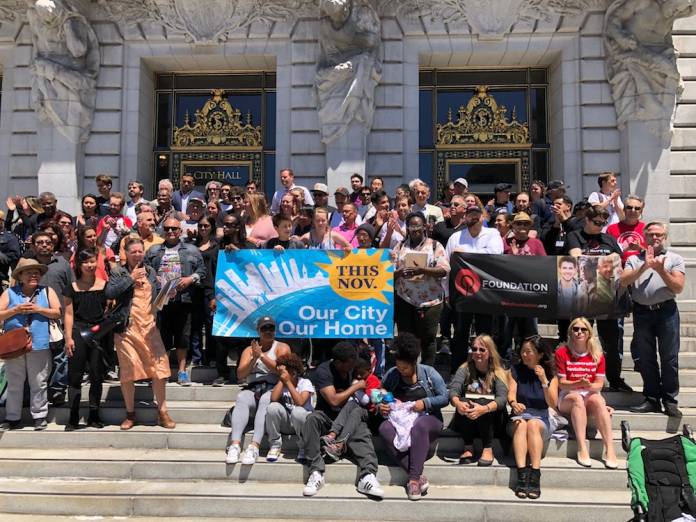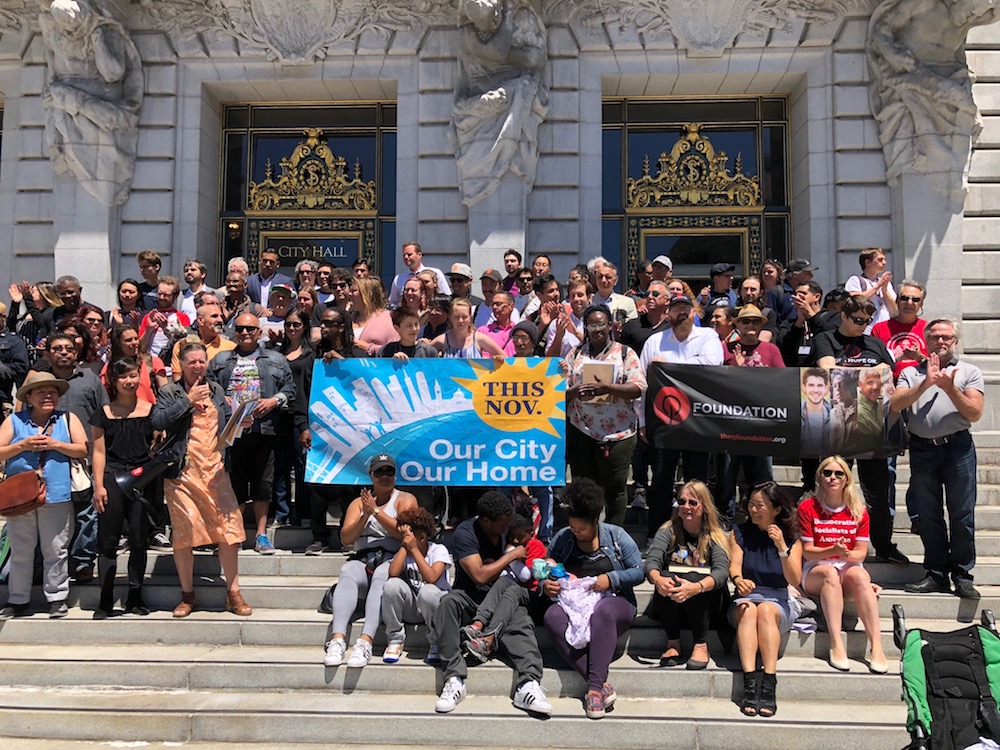
Sponsors of a measure that would raise hundreds of millions of dollars to build supportive housing, increase the city’s shelter capacity, and fund efforts to prevent homelessness turned in 28,000 signatures today – almost three times the number needed to qualify the measure for the November ballot.
The measure – written by a grassroots operation headed by the Coalition on Homelessness – could be the most important legislation in years to address the crisis on the streets.

It would raise taxes on companies with more than $50 million in gross receipts – the biggest beneficiaries of the Trump tax cuts – and use the money to build 4,000 units of supportive housing, add 1,000 shelter beds, and provide extensive mental-health services.
The measure states clearly that the money raised must be put in a special fund that can’t be used for other things – and can’t supplant existing homeless-services funding.
There was a moment about a week ago when advocates were worried – the sponsors had hired a firm with paid signature-gatherers to help with the work of collecting about 10,000 valid signatures, but with the competition from other areas (landlords were paying $40 a signature to overturn rent control in Mountainview) the workers were all going elsewhere.
So the Coalition asked for help; 48hills and the Examiner did stories about the need for volunteers, the social media networks buzzed, groups like the Democratic Socialists of America rallied their members – and the result was overwhelming.
“We put out the call, and more than 500 people came out,” Jennifer Friedenbach, director of the Coalition on Homelessness, said at a rally today.
It was a powerful statement about grassroots energy, coming out of the mayor’s race and heading to the fall election.
Jackie Evans, who was homeless for 14 years, said that “we don’t have to wait on the sidelines anymore.” The voters will have a clear choice – tax the wealthy to provide housing for homeless people – in November.
Cleve Jones described how he had fled Phoenix in the 1970s to come to San Francisco, and wound up homeless before he met “the heroes of the movement – people like Tom Ammiano and Harvey Milk – who helped him get on his feet.
“I meet the kids today who remind me of myself and there is no place for them,” he said. “My generation, who survived the pandemic, survived the vicious bigotry, are being forced out.”
The measure will have the support of pretty much every progressive elected official and organization in the city. “The Chamber of Commerce says it will vigorously oppose it,” Friedenbach said. “But big money doesn’t win all the time.”
I’m sure the Chamber will, indeed, be leading the opposition – but that old-school business group has become almost irrelevant in modern SF politics. The real question: Will Big Tech put up millions to kill this? Will Ron Conway and his allies really want to say that the companies that saved millions thanks to Trump can’t kick in a little bit more to help solve what many call the city’s most pressing problem?
Which of the perhaps 250 companies that would have to pay the tax is going to put up money against it? Does Bank of America or Wells Fargo, for example, really want to face the public backlash that would come with an all-out attack on this measure?
Where will Mayor London Breed come down?
I don’t know – but this is going to be one of those crystal-clear moments in San Francisco history where there is no nuance, where the ultra-rich are on one side, the supporters of rational homeless policy are on the other – and everyone in office and in public life is going to have to tell us which side they are on.

